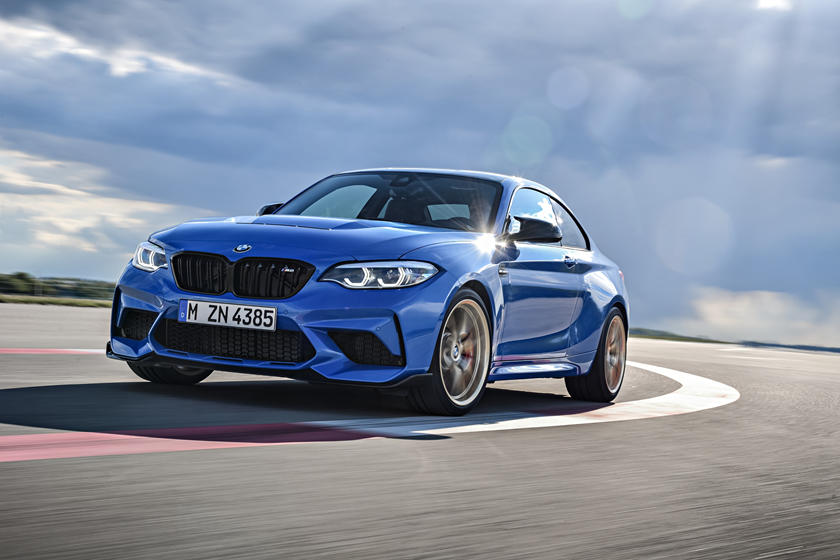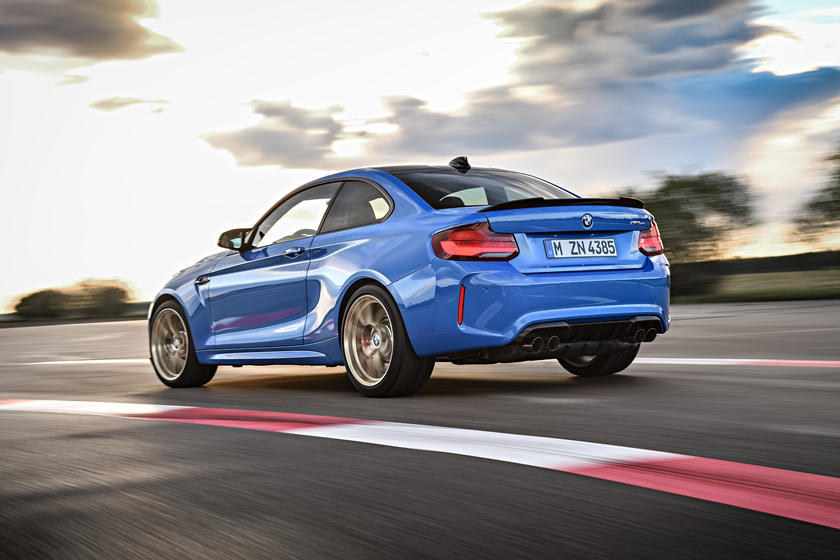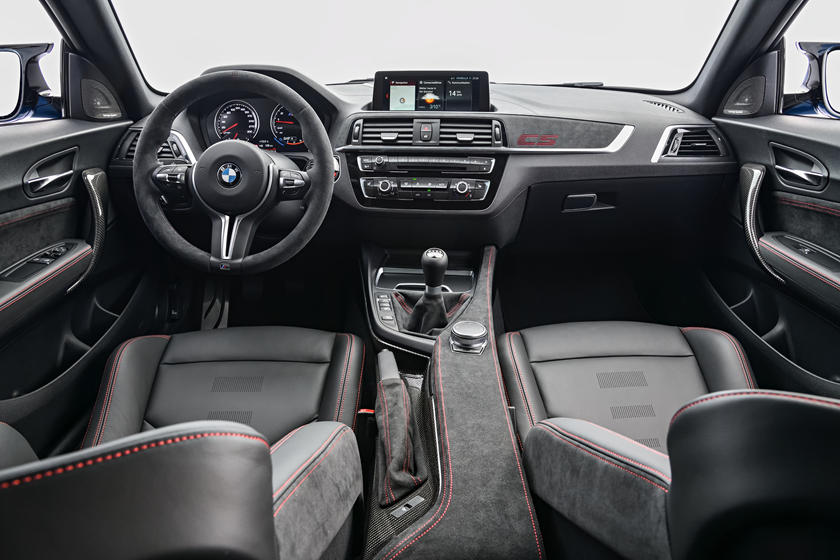by Ian Wright
The BMW M2 CS special edition is a swansong for the current generation M2. Compared to the M2 or the M2 Competition, it has a smaller footprint, bigger power figures, lighter weight, and the addition of adaptive suspension earmark it as possibly one of BMW's M performance division's most outstanding achievements as a pure enthusiast car.
If the M2 is a focused driver's car, then the M2 CS is hyper-focused. Along with an incredibly taught and responsive chassis, the M2 CS packs BMW's soon-to-be-legendary S55 twin-turbo straight-six engine creating 444 horsepower and 406 lb-ft of torque. That's 39 horsepower more than the Competition model and gives the CS a 0-60 mph time of 3.8 seconds, 0.2 seconds faster than the Comp. That's not a huge difference for a car that costs over $24,000 more. The question is whether the other enhancements and special edition status make the M2 CS worth the money. Then again, with competitors few and far between, and the likes of the Mercedes-AMG CLA45 not quite in the same league, it doesn't matter what BMW wants to charge - the CS is worth it.
The M2 CS is an all-new special edition signifying the end of the current generation M2, and if you're buying one, you want people to know just how special it is. The most obvious changes over the regular M2 Comp are all carbon. You get the stuff in the roof, the new vented hood, the mirror caps, the front splitter, the trunk spoiler, and the rear diffuser. Special lightweight wheels are also added, along with a host of Alcantara changes inside. The transmission tunnel is also crafted from carbon fiber, and the seats are stunning buckets from the M4 Competition. The engine has been retuned to be as powerful as in the M4, while the suspension is an M Adaptive setup for the first time on a 2 Series.
See trim levels and configurations:
| Trim | Engine | Transmission | Drivetrain | Price (MSRP) |
|---|---|---|---|---|
| CS Coupe |
3.0L Twin-Turbo Inline-6 Gas
|
6-Speed Manual
|
Rear-Wheel Drive
|
$83,600 |
Starting from the front, the M2 CS has the trademark LED halos in its headlights and the (pre-Bugs Bunny) kidney grilles, with a carbon splitter beneath the front bumper. A bulging vented hood, muscular aches, and 19-inch wheels add to the aggressive look of the car, while carbon mirror caps, a carbon roof, and a carbon trunk spoiler gradually draw your eyes towards the rear, where a carbon diffuser houses slightly altered quad exhaust tips with the M logo. The changes compared to the regular M2 are subtle but effective, while a unique paint offering and gold alloy wheels can be equipped.
Much of the M2's efficacy comes from the fact that it is small and light, and the CS variant is no different. Length from end to end measures 175.6 inches while the wheelbase takes up 106 inches of that. Width measures 73.7 inches across excluding the mirrors, while height is 55.7 inches. Curb weight starts at 3,583 lbs for the manual while adding the seven-speed DCT automatic bumps this to 3,638 lbs. The weight can, however, be reduced slightly with the inclusion of carbon-ceramic brakes in place of the standard M Compound setup.
Packing the same power plant as the outgoing BMW M3, the M2 CS has a twin-turbo straight-six with 444 hp and 406 lb-ft of torque. The CS generates its peak torque around the 2,500 rpm mark, so there's no lag from the turbos when launching the little car from a stop, and at any speed, there seems to be acceleration in reserve. It sounds a little industrial as you fire the S55 straight-six up and give it a rev, and not an exotic-sounding engine. But in a body as small as the M2 CS, the S55 is positively ferocious when let loose.
Our loaner came with the seven-speed dual-clutch transmission rather than the six-speed manual. Changes are sharp, snappy, and full of purpose. It's the perfect partner to the engine for going fast. Unfortunately, there are issues when it comes to daily driving. The first is that there's no torque converter with the dual-clutch transmission to engage the engine at idle. That means things can be a little jerky pulling away from a stop or navigating parking lots at a crawl. It also means the car will roll backward when on an incline as if you had the clutch of a manual transmission pressed in, which is not something you're expecting in an auto. You'll get used to that, but maybe not the jerky drive engagement when cruising around town. However, when you reach a back road or the track, you'll forgive it instantly.
Sadly, the pandemic struck track time with the CS from our agenda, so we had to make do with a week exploring California backroads with the car. While doing so, the second thing that struck us was just how much grip the chassis, suspension, and tires work together to generate. The first was just how rapidly it accelerates. The M2 CS is startlingly quick, and pedal response is sharp, so achieving smooth power delivery requires some careful throttle management.
Toss the CS down a winding road, and it comes together beautifully, though. The short, square wheelbase is agile but not as twitchy as you might expect with so much power trying to push the tires out at the back under acceleration. Part of that is down to the computer-controlled locking differential, but the real highlight is the front-end grip. The M2 CS stamps its foot down petulantly and refuses to understeer, leaving the rear to pivot with ease. Between that and the body control from the stiffened chassis and suspension, the CS darts, dodges, and weaves through the most technical of roads with relentless confidence and accuracy. It's huge fun that genuinely harks back to the M3s of old and the sheer joy to be had in carving tight lines through twisting roads.
But it's not all roses living with the CS. On top of the awkward transmission when commuting, the adaptive suspension has a comfort mode that is a bit of a misnomer. We've experienced less forgiving suspension, but it would take extreme dedication to live with the M2 CS on a daily basis. However, few people are likely to buy an M2 CS for driving to work or going on grocery runs. They're either going to park it in a temperature-controlled garage and bank on its future value as a collector's car or drive it as intended. And the M2 CS is intended to be driven hard and fast around as many twisting backroads and tracks as one can find.
The manual M2 CS returns official EPA figures of 17/24/20 mpg on the city/highway/combined cycles, while the DCT version manages 16/23/19 mpg on the same cycles. The M2 Comp scores 18/25/20 and 17/23/19 respectively. With a 13.7-gallon gas tank, you can expect around 274 miles from the CS with mixed driving. Through our week with the CS, we didn't get near the 19 mpg mark, and despite some freeway driving thrown in, we only saw 17 mpg indicated briefly before it settled at 16.
The 2 Series in any form is rather cramped for rear passengers, and the M2 CS is no different. Although marketed as a four-seater, only toddlers would be comfortable with the legroom in the back. In front, headroom and legroom are more than adequate for just about any frame, and the pedals, steering wheel, and other controls are well placed. The power-adjustable front seats with memory have plenty of range for movement and offer lumbar and thigh support too. In addition, visibility is good in all directions. Overall, the CS is a comfortable and supportive place to sit, as long as you're in the front, while the Alcantara dash detailing sets it apart and makes it feel extra special.
The M2 CS is surprisingly capacious on paper, offering 13.8 cubic feet of volume in the trunk. Unfortunately, due to the shape of the trunk, you can only really fit a pair of medium-sized suitcases and some carry-ons in the back. In the cabin, door pockets, a small glovebox, and a pair of cupholders are joined by a spot for your phone. In a car of this size, that's not too bad. However, the center armrest bin has been deleted.
The M2 CS, despite its sportier aspirations, carries many of the M2 Competition's features over, including push-button ignition, ambient interior lighting, a rearview camera, parking sensors, rain-sensing wipers, adaptive LED headlights with auto high beams, dual-zone climate control, dynamic cruise control, and a limited-slip differential. It also gets adaptive suspension, heated and power-adjustable front seats, auto-dimming and heated power-folding wing mirrors, and the usual traction and stability programs with variable drive modes. However, because of the carbon-fiber-reinforced plastic roof panel, you can't have a sunroof.
The interior of the M2 is spartan, but the infotainment system isn't lacking in usefulness. BMW's iDrive is the centerpiece, housed on an easy-as-ever-to-use 8.8-inch touchscreen. The M2 CS comes standard with a pair of USB ports, Bluetooth, voice control, SiriusXM satellite radio, navigation, voice control, and Apple Carplay. Android Auto is conspicuous by its absence, but an excellent 12-speaker Harman Kardon premium sound system is standard equipment.
Thus far, the M2 CS has been free of recalls, but it may be worth noting that last year, the M2 Competition suffered a recall for potentially improperly folded knee airbags that may not deploy properly.
In terms of coverage, the M2 CS comes with a four-year/50,000-mile basic and powertrain warranty, 12 years of corrosion cover, four years of roadside assistance, and a three-year/36,000-mile complimentary scheduled maintenance plan as standard.
Neither the M2 CS nor its Competition sibling have been tested by either the NHTSA or the IIHS, but the 2 Series coupe on which these models are based won a Top Safety Pick award in 2018 from the latter agency and, for 2020, retains a spread of Good ratings for all crashworthiness tests.
Standard safety features include frontal, side-impact, curtain, and knee airbags. Also included are the usual traction and stability control systems, a rearview camera, dynamic cruise control, adaptive LED headlights, rain-sensing wipers, and parking sensors.
Unfortunately, outside of being a collectible car, the CS doesn't, to us, provide enough performance over the Competition to justify the substantial extra cost. The adaptive suspension certainly doesn't differ enough in the modes to justify the additional complexity. On top of that, the extra power and the weight savings from the carbon-fiber replacement body parts don't add up to a tangible difference to separate the CS from the Competition's straight line ability.
On the track, the lighter roof, increase in power, and adaptive suspension may interest those who care for shaving tenths of a second off their lap times.Alternatively, for those that don't mind paying the extra cash, relish a special edition, and want one of the coolest looking M cars on the planet, then the CS is perfect. For the rest of us, we'll take a normal M2 Comp if it's going to be a daily driver and find occasional track use. It's as simple as this, the BMW M2 is as close to perfect as an M car has been in years. The CS may amplify certain traits, but at the end of the day, even a non-CS M2 is still a recipe BMW struggles to match with its other offerings.
Official pricing is listed at $83,600 before a $995 destination charge, but the CS only launches in the States in the second half of the year. Although we don't know exactly how many are coming for this 2020-only model, rumors suggest no more than just 400 units arriving on our shores. Very few options are available, however: a dual-clutch automatic transmission, carbon-ceramic brakes, Michelin Pilot Sport Cup 2 tires, and matte gold wheels. Also available is a choice of four colors: Alpine White, Black Sapphire Metallic, Hockenheim Silver Metallic, and the exclusive Misano Blue Metallic. All in all, we expect a fully loaded model to nudge six figures.
There's just the one special edition model, and the options are limited, but one is particularly important. BMW's manual transmissions aren't our favorite at the moment, but they're far from bad, and if you're a die-hard enthusiast and want that extra connection with the car, it's the right choice. For us, though, the dual-clutch auto is perfectly matched to the engine. It's a lot of fun to control; it's faster and as aggressive as the engine. If you're going for the CS version of the M2, it makes little sense to scrimp out of opting for the carbon-ceramic brakes, and the M2 deserves the sticky Michelin Pilot Sport Cup 2 tires. The gold wheels will boil down to taste, but we think they're the best paired with the Misano Blue Metallic paint option.
| Competitor | Horsepower | MPG | Price (MSRP) |
|---|---|---|---|
| BMW M2 CS | 444 hp | 17/24 mpg | $83,600 |
| BMW M2 | 405 hp | 18/24 mpg | $58,900 |
| BMW M4 Coupe | 473 hp | 16/23 mpg | $72,000 |
For a premium of over $20,000, is the CS that much better than the Competition? The Comp, on paper, is almost identical. A 3.0-liter twin-turbo straight-six powers this variant too, developing 405 horsepower and 406 lb-ft of torque, just 39 horses less than the CS. It, too, can be had with either a manual or a dual-clutch auto and is just two-tenths of a second slower from 0-60 mph. The M2 Competition also has a limited-slip diff and just as many comfort features, slightly better cabin storage solutions, and just as much potential for fun. However, the CS is lighter and comes with adaptive suspension, something not even available as an option on the Comp. It's also a more special car and feels like one. If you can spare it, that extra $20k is worth spending for arguably the best BMW M car we've seen in decades.
At a base price of almost $70,000 for the M4 Competition, the big brother of the M2 CS is quite a bargain. With the Competition package, power is bumped up to the same 444 horses, and the M4 is also available with the same transmission choices. It offers far more space for rear passengers, although it's still very cramped in the back for adults. Fuel economy is marginally better, and the sprint from 0-60 mph is identical to that of the M2 CS. However, top speed without the M Driver's Package is just 156, and with it, you can only get to the same 170 mph, if you have the right tires. Thus, the bigger M4 is similar in the acceleration stakes and in the top speed ratings, but with a bigger body comes more practicality, right? Wrong. The M4's trunk is actually 2.8 cubes smaller than the M2's. In addition, a new M4 is coming towards the end of the year. Unless you want the added control that comes with a longer wheelbase when sliding the car, the M4 is unfortunately outshone in key departments by its little brother.
The most popular competitors of 2020 BMW M2 CS:






